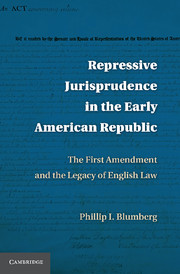 Repressive Jurisprudence in the Early American Republic
Repressive Jurisprudence in the Early American Republic Book contents
- Frontmatter
- Contents
- Acknowledgments
- 1 Political and Jurisprudential Worlds in Conflict in the New Republic
- 2 Politics in the New Republic
- 3 Criminal Libel in the Colonies, the States, and the Early Republic During the Washington Administration
- 4 Federalist Partisan Use of Criminal and Seditious Libel – Statutory and Common Law – During the Tumultuous Adams Administration
- 5 Criminal Libel During the Jefferson and Madison Administrations, 1800–1816
- 6 Partisan Prosecutions for Criminal Libel in the State Courts: Federalists Against Republicans, Republicans Against Federalists, and Republicans Against Dissident Republicans in Struggles for Party Control
- 7 Established Jurisprudential Doctrines (Other than Criminal Libel) Available in the New Republic for Suppression of Anti-Establishment Speech
- 8 Still Other 19th-Century Doctrines for Suppression of Anti-Establishment Speech: The Law of Blasphemy and the Slave State Anti-Abolition Statutes
- 9 Conclusion
- Table of Cases
- Index
9 - Conclusion
Published online by Cambridge University Press: 05 October 2010
- Frontmatter
- Contents
- Acknowledgments
- 1 Political and Jurisprudential Worlds in Conflict in the New Republic
- 2 Politics in the New Republic
- 3 Criminal Libel in the Colonies, the States, and the Early Republic During the Washington Administration
- 4 Federalist Partisan Use of Criminal and Seditious Libel – Statutory and Common Law – During the Tumultuous Adams Administration
- 5 Criminal Libel During the Jefferson and Madison Administrations, 1800–1816
- 6 Partisan Prosecutions for Criminal Libel in the State Courts: Federalists Against Republicans, Republicans Against Federalists, and Republicans Against Dissident Republicans in Struggles for Party Control
- 7 Established Jurisprudential Doctrines (Other than Criminal Libel) Available in the New Republic for Suppression of Anti-Establishment Speech
- 8 Still Other 19th-Century Doctrines for Suppression of Anti-Establishment Speech: The Law of Blasphemy and the Slave State Anti-Abolition Statutes
- 9 Conclusion
- Table of Cases
- Index
Summary
Introduction
The modern reaction to the Sedition Act of 1798 is one of shock and surprise: how could the democratic New Republic founded with all the aspirations expressed in the Declaration of Independence, the Constitution, and the Bill of Rights have accepted so repressive a statute? In a society apparently dedicated to freedom of speech and press, the Act authorized criminal punishment of political critics ridiculing or contemptuous of the Adams administration.
How was it that the Revolutionary American society that had fought a desperate war for Independence, thrown aside the monarchy, and with limited exceptions rejected the concept of the established church could have accepted such pernicious measures of the English criminal common law so contrary to the fundamental political values of the New Republic? How was it that the Congress enacted the statute? How was it that in not one of the numerous federal decisions upholding punishment of Jeffersonian editors and supporters or in any of the even more numerous state decisions did a single judge – whether sitting in the federal or the state courts, whether a Federalist or a Republican – ever express doubt over the constitutionality of the proceedings in the face of constitutional guaranties of freedom of speech and press in the federal and state Constitutions?
This review of the jurisprudence of the Early American Republic in which criminal libel and other repressive legal doctrines formed a significant part of the accepted law serves to explain this surprising development.
- Type
- Chapter
- Information
- Repressive Jurisprudence in the Early American RepublicThe First Amendment and the Legacy of English Law, pp. 374 - 382Publisher: Cambridge University PressPrint publication year: 2010


